Mario Gomez: 10 things on the VfB Stuttgart and Germany star
autty 2018-05-01 18:21:02 评论
VfB Stuttgart and Germany striker Mario Gomez has been lighting up European football in the Bundesliga and beyond for over a decade, ever since bursting onto the scene as a fresh-faced youngster in 2006.
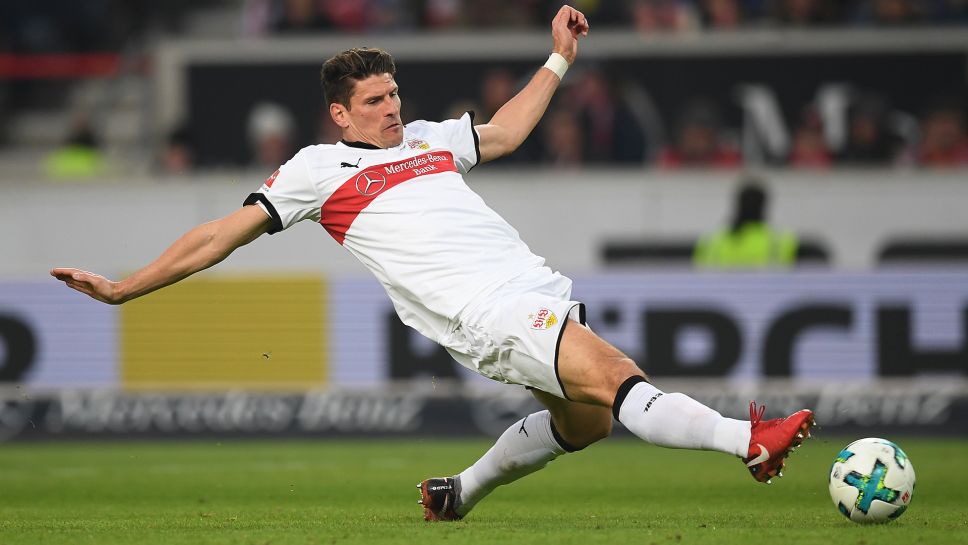
The 32-year-old has gone full circle this season, finding his way back to boyhood club Stuttgart after treading a fascinating career path: from tasting glory with Bayern Munich to battling relegation with Wolfsburg, via contrasting stints in Italy and Turkey, there hasn't been a dull moment for the 73-time Germany international.
As much a style icon as a sporting personality – and even boasting his own website (http://mario-gomez.de/) – Gomez certainly stands out from the crowd. As he bids to join Die Mannschaft for their FIFA World Cup title defence in Russia this summer,
bundesliga.com retraces the history of a centre-forward who has left an indelible mark on German football…
1) Spanish roots, Brazilian idols
As you might have guessed from his name, Gomez has Spanish roots: his father Jose Gomez Garcia hails from the small village of Albunan, near Granada, while his mother Christel Roth is German. Young Mario inherited his father's love of football from an early age, and has fond memories of his cousins and uncles piling round to the house to watch El Clasico on television.
"My family were all Real Madrid fans, but when it comes to football, nobody could tell me what to do," Gomez wrote in The Players' Tribune. "So I decided to root for Barcelona. I loved watching the Brazilian players: Ronaldinho, Rivaldo, and my all-time favourite, Romario. I admired the lightness with which he moved inside the box, and the space he was able to create for himself."
2) Coming of age in Stuttgart
Born in nearby Riedlingen, Gomez turned down an offer to join local club Stuttgart at the age of 13, feeling it was too soon to leave home. He nevertheless ended up on the books at Die Schwaben at 16, and by 18 he was coming up against the likes of Frank Lampard and Marcel Desailly in the UEFA Champions League. Inspired by legendary Italian coach Giovanni Trapattoni – who only spent eight months in charge at VfB – Gomez became a formidable finisher, helping his club win their fifth German title in 2006/07. To put the icing on the cake, he was even voted Germany's Footballer of the Year for 2007.
"I was shocked," Gomez admitted, after being informed of the accolade by a kicker journalist. "To be honest, the most important thing for me was that Stuttgart were champions again, after years of finishing fifth or sixth, and I was a part of that success. The award – well, that put me on everyone's radar. I felt like I had finally arrived in professional soccer."
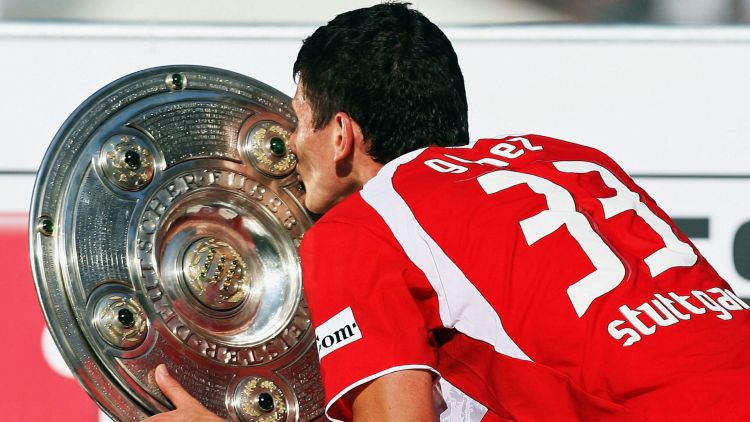
3) The curse of Klagenfurt
After hitting 28 goals in all competitions for Stuttgart the following season, Gomez was included in Joachim Löw's squad for UEFA Euro 2008, and at 23 years of age he was expected to take the tournament by storm. Things didn't go quite as planned, though. Germany's new No.9 spurned a great chance early in their opener against Poland in Klagenfurt, then somehow failed to hit the target from barely three yards out against Austria in Vienna. Gomez found himself dropped to the bench for the knockout stages, only coming on as a late substitute in the final defeat to Spain, the country of his forefathers.
"You play your first game at a tournament for Germany, and after four minutes a golden opportunity comes along and you miss it," Gomez said after the Poland game, which Die Mannschaft eventually won 2-0 thanks to a brace from Lukas Podolski. "Afterwards, I asked myself again and again: why did the ball have to run that little bit too far? I'm sure the whole Euros would have turned out very differently for me, if that ball had gone in."
4) Joining the big boys
While Gomez may have missed the chance to star at the Euros, he nevertheless earned a high-profile move to Bayern in the summer of 2009, setting a new Bundesliga transfer record in the process. It took him a little while to adapt to the demands of playing for the Bavarian giants – he only scored 10 goals in his first campaign – but after injuries to fellow strikers Miroslav Klose and Ivica Olic, Gomez seized his opportunity. In 2010/11 he scored a hat-trick against Hannover on Matchday 8 and never looked back, going on to finish as the Bundesliga's top scorer with 28 goals. Within the space of seven months he had gone from an increasingly peripheral figure to one of the first names on Louis van Gaal's teamsheet.
"It was one of the biggest victories of my career," he admitted. "I had completely changed van Gaal's mind about me as a player. More importantly, when things weren't going easy for me, I learned how to work through it."
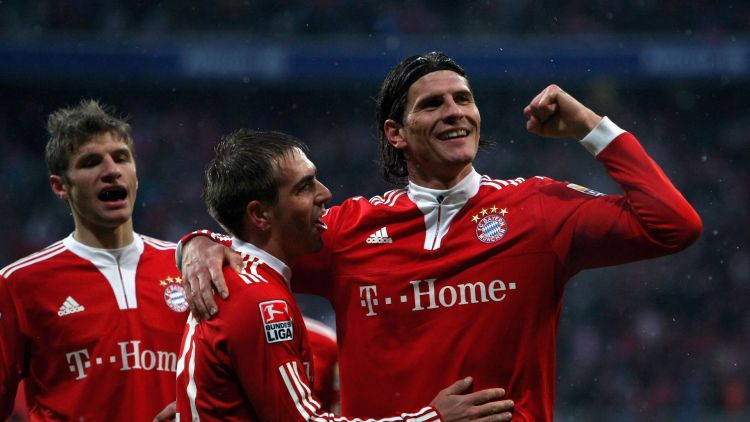
5) Champions League heartbreak
Gomez carried his momentum into 2011/12 as Bayern attempted to prise the Bundesliga title back from Borussia Dortmund – yet in spite of an impressive 26-goal haul from their star striker, the Bavarians were forced to settle for second place behind BVB. It turned out to be a miserable end to the campaign, as Jupp Heynckes' side were first beaten 5-2 by Dortmund in the DFB Cup final – and then, a week later, conceded a traumatic defeat on home soil in the Champions League final against Chelsea.
"We were in Munich, in front of our fans, on our field," Gomez lamented. "The game was ours, we were in control for most of the match, but we ultimately lost 4-3 on penalties. It remains the saddest day of my career. After all we had done, to not be the ones raising the trophy was hard. It's still hard."
6) Going out with a bang
Like his teammates, Gomez was determined to rise from the ashes of that Allianz Arena defeat and prove that Bayern were not just the best in Germany, but also in Europe. The story of their fabled 2012/13 season is well documented, although Gomez himself only joined the fray in November after undergoing ankle surgery in the summer. Facing increasing competition from Mario Mandzukic, he only made nine league starts that season – although he still contributed 19 goals in all competitions. Crucially, he was the hero in the DFB Cup final against his old club Stuttgart, scoring twice as Bayern won 3-2 to complete their unprecedented treble. That would be the last of his 174 appearances for FCB, in which he scored an eye-watering 113 goals.
"It's really tough at a club like Bayern," he confessed. "You have to be at 100 per cent every day, and the stakes and expectations are always higher. Having won league titles and the Champions League trophy, I decided that I wanted to try something else. So I went to Italy, to play for Fiorentina."
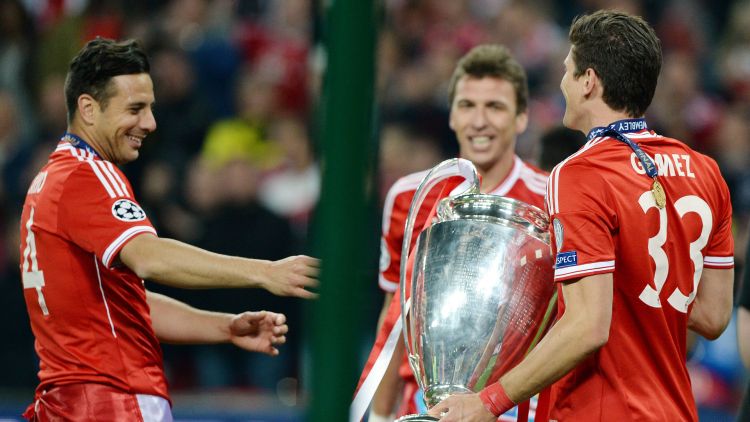
7) Injuries in Italy, triumph in Turkey
Gomez's two-season spell with the Viola was probably the low point of his career to date. Plagued by injuries, he only made 15 appearances in all competitions in 2013/14, which meant that he had dropped off Löw's radar by the time the 2014 World Cup rolled around. Having only made four substitute appearances at the 2010 tournament, he was forced to watch on television as his namesake Mario Götze secured football's ultimate prize for the fourth time in Germany's history.
"I saw the guys lift the trophy in Brazil, and I wasn't there because of injury," he said. "And I knew right then I didn't want to miss a moment like that again. So in Italy, I made a decision. I told myself, 'I don't want things to end like this. I need to play for my country again.' I focused on getting healthy and fit for Euro 2016."
The key move was joining Besiktas on loan in the summer of 2015. Gomez flourished in Istanbul, finishing as top scorer in the Turkish Süper Lig with 26 goals as his side conquered their first title in seven years. He might have stayed longer in the city but for the turbulent political situation, but he had nevertheless done enough to earn a spot at the Euros.
"Life in Istanbul gave me this rush," he recalled. "I fed off the energy, and the day we won the league, I finally felt happiness as a footballer again."
8) From France to Russia?
The 2008 tournament may have ended in frustration for Gomez, but he has certainly enjoyed more success at the Euros than at the World Cup – unlike, for example, his Germany teammate Thomas Müller. In 2012, when at the peak of his powers with Bayern, he scored all three of his side's goals in group-stage wins over Portugal and the Netherlands, although Die Mannschaft were ultimately defeated by Italy in the semi-finals.
Euro 2016 was a similar story. Gomez scored in consecutive wins over Northern Ireland and Slovakia to help Germany into the quarter-finals, where they got their revenge over Italy by winning a tense penalty shoot-out. However, a thigh injury kept him out of the semi-final against France, and without a recognised striker Löw's men succumbed to a 2-0 defeat at the hands of the hosts.
The question now is whether 'Super Mario' has done enough to convince Löw to take him to Russia for the World Cup this summer. While the emergence of Timo Werner and Sandro Wagner has given the Germany coach alternative options in attack, neither player has Gomez's major-tournament experience.
"More than anything, I want to be with the squad in Russia at the 2018 World Cup," he confided. "Right now, every moment I’m on the pitch for Germany is something special."
9) Keeping the Wolves from the Bundesliga trapdoor
Gomez returned to Germany in summer 2016, and played a key role in helping a struggling Wolfsburg side preserve their 20-year Bundesliga status. As well as grabbing 16 goals during the league campaign, the 32-year-old netted again as the Wolves saw off local rivals Eintracht Braunschweig in the relegation play-off. Gomez was the target of some colourful chants from the Braunschweig fans during their Lower Saxony double-header, although it was VfL who had the last laugh when announcing their star man's subsequent contract extension on social media: 'To quote former US president Franklin D. Roosevelt: "He may be a son of a bitch, but he's our son of a bitch."'
During his stint at Wolfsburg, Gomez scored the club's 1000th goal in the Bundesliga and was handed the captain's armband by coach Andries Jonker at the start of 2017/18.
"I understand every player when he says it's a dream to be named captain of your team," Gomez told kicker. "It’s very special and it means you're doing a good job. However, I don't need to wear the armband as some sort of symbol or recognition. I've always had a close relationship with the coaches I've played for in my career, without being captain."
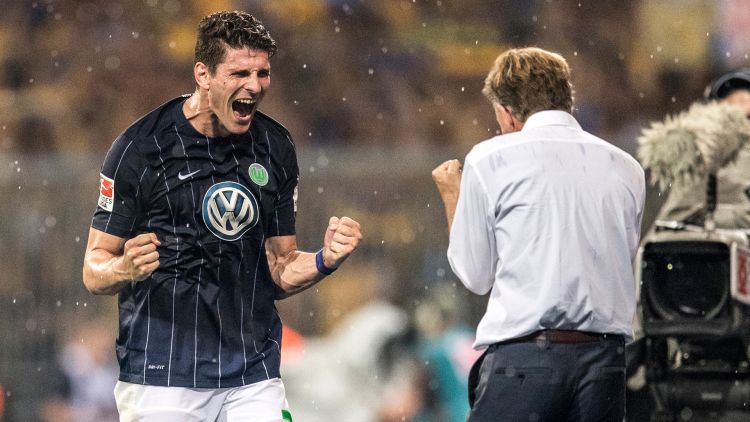
10) Back to where it all began
Making Gomez their captain did not have the effect Wolfsburg might have desired. The former Bayern man only managed a single goal during the 2017/18 Hinrunde – though he was admittedly sidelined for six weeks with another ankle injury – and it was perhaps no surprise that he chose to return to boyhood club Stuttgart during the winter break.
"I'm really happy to be back home, where it all began for me," he told VfB's official website. "I've realised how much I wanted to come back to Stuttgart. I know there are a lot of expectations and that we're in a difficult situation – we have to give our all to stay up. I'm looking forward to the club, the city, the people, the surroundings and my family. I can't wait to get started."
In January, Stuttgart were 14th on 17 points, while Wolfsburg were 12th with 19. Fast forward to the start of May and the former are up to eighth with 45 points, while the latter are in the relegation play-off place with 30. It has been some turnaround for Tayfun Korkut's side, who have picked up a whopping 28 points during the Rückrunde – second only to champions Bayern (40).
Much of it is down to Gomez, whose consistency in front of goal in his early VfB days earned him the sobriquet 'Mr Reliable'. As well as bringing composure and leadership to the squad, the 32-year-old has provided six goals and an assist, helping his side to key wins over fellow strugglers Augsburg, Cologne and Freiburg. His reward? A surprise inclusion in the Germany squad for March friendlies against Spain and Brazil, which lent credence to the idea that the veteran striker will indeed be in Russia this summer.
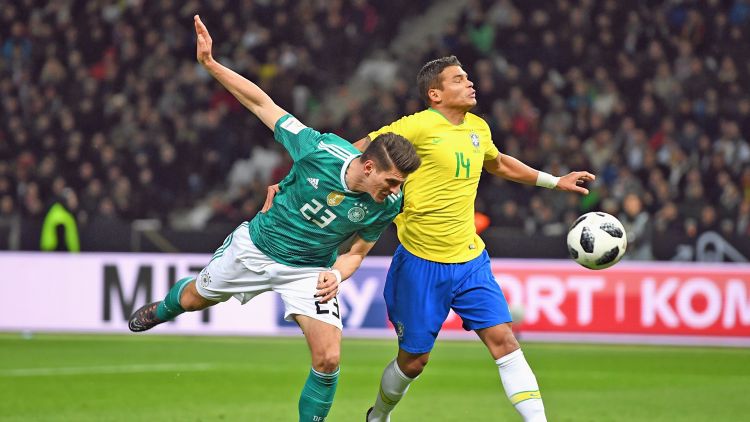
It has been rightly argued that Gomez is one of the most underrated stars in Bundesliga history, given that he has amassed an eye-watering total of 161 goals and 48 assists in 296 top-flight appearances. That puts him 13th in the all-time scorers list, while only four men have a better goals-to-minutes ratio. But though he rarely features in discussions of Germany's all-time greats, the three-time Bundesliga winner will surely be remembered as one of the best of his generation, a peerless finisher for whom finding the back of the net has always been the pinnacle of the footballing experience.
"I've played for many clubs, many managers, and been through many highs and lows – but one thing has never changed, and that's the feeling of scoring a goal. It's the moment I live for every week. I wish everyone could feel it just once. It's an explosion of feelings. Before you kick the ball, you feel like you're 200 kilos – then it leaves your foot, goes through the air and ripples the net. And for that moment, you're weightless."
- 消息参考来源: BUNDESLIGA
- 严禁商业机构或公司转载,违者必究;球迷转载请注明来源“懂球帝”
- 懂球帝社区规范:抵制辱骂

